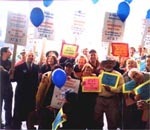
Sagging Negotiations?
Written by Kristen Paulson | Posted by: Anonymous
Our last report of the ongoing strike was "An Open Letter to the New England Creative Community" from the SAG/A.F.T.R.A. Strike Committee, which appeared in our July 2000 issue. Here’s a recap, interspersed with actor Will Lyman’s commentary, not intended to represent SAG as a whole:
Since May 1, 2000, SAG/A.F.T.R.A. has been on the longest strike in its history over the terms for new commercial contracts, covering TV and radio commercial work. The embroiled parties are:
(The Actors)
-American Federation of Television and Radio Artists (A.F.T.R.A.)
-Screen Actors Guild (SAG)
(The Media Giants)
-Association of National Advertisers (ANA)
-American Association of Advertising Agencies (AAAA)
SAG/A.F.T.R.A. reluctantly called the strike when national negotiations broke down. Here are the four major points of contention:
1. Network Class A Use
The industry wants to eliminate pay per play on network commercials. SAG/A.F.T.R.A. doesn’t want to give back this basic provision, which has been in its contracts since the 1950’s.
2. Pay per Play for Cable
SAG/A.F.T.R.A. would like a formula in place that would pay more for heavier cable use. The advertisers won’t consider it. "Advertisers will never approve this for cable," says Will Lyman. "They rejected the proposal out of hand, and want to pay talent one flat fee. SAG/A.F.T.R.A. agrees that their cable proposal is too expensive, but that’s because negotiations didn’t progress. The process is for both parties to make demands at extreme ends of the spectrum followed by bargaining. In this case, however, the advertisers refused to talk."
3. Monitoring
SAG/A.F.T.R.A. requires a system to track where work has aired and how it has been used to ensure correct payment. "SAG/A.F.T.R.A proposed that an independent agency monitor commercial usage. The union hired one to follow a number of programming hours, which uncovered $500,000 in unreported payments. Currently, the ad agencies are unmonitored, and aren’t providing accurate figures," says Lyman.
4. Commercials on the Internet
SAG/A.F.T.R.A. wants to claim jurisdiction over spots produced for the Internet. Regardless of the delivery system, they seek to have their performances in commercials covered in agreements with advertisers. The agencies will not discuss it. "Currently, there is no guide for the Internet, and no compensation for those produced directly for the Internet. Normally, if there is use beyond the original purpose (i.e. from radio to Internet) then there are further negotiations. There was absolutely no discussion of this issue. Once digitized, commercials are unstoppable, and the advertisers’ take potentially huge [percentages] — only 1.4% of which goes to the talent (the actor)," says Lyman.
There have been several developments since the letter. First, SAG/A.F.T.R.A. held a "Stop The Rollbacks Rally" on August 23rd in Copley Square, MC’d by Jimmy Tingle. In a show of brother- and sister- hood, The International Brotherhood of Electrical Workers and Verizon Communications were present to lend their support.
Tingle and cast members of Shear Madness stirred up the crowd with mock television and radio auditions. Attendees were exhorted to send delegations to advertising agencies Hill Holliday, Arnold Communications as well as Entercom, the fourth largest radio broadcasting company in the United States, demanding fair contracts for actors and broadcasters. Their message? SAG/A.F.T.R.A. won’t give up until they’ve halted the contract rollbacks.
As reported on the SAG Web site on August 16, commercial contract negotiations will resume on September 13 in New York City. Both sides are coming back at the behest of federal mediators, who arranged their previous meetings.
Will Lyman offered these final thoughts on the strike: "I’m fortunate — this kind of work is only about 30% of my income, since I’m well diversified within the trade. [The strike] could go on for a while. Advertisers are a tough adversary because they control the media. SAG can only do its best, and intends to withhold services indefinitely, refusing to work for the wages offered." Concluded Mr. Lyman, "We won’t let them get away with this."
Those sound distinctly like fighting words.
Special thanks to Joan Debow, SAG’s Director of Freelance Contracts, for her help with this article.










